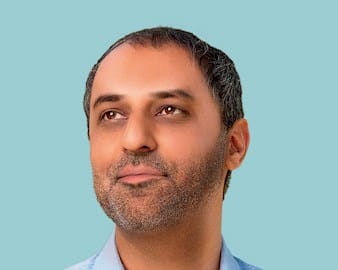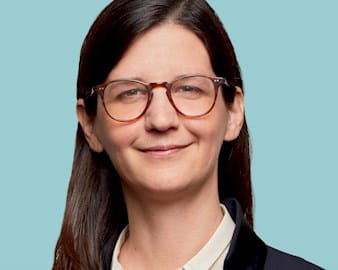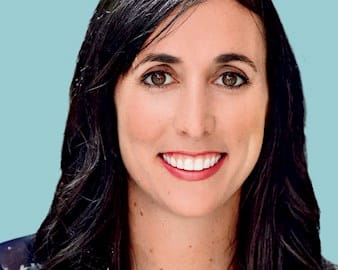Since its founding, the Polsky Center for Entrepreneurship and Innovation’s Edward L. Kaplan, ’71, New Venture Challenge (NVC) has schooled nearly 370 still-active startup companies in the art of real-world business success. Myriad program alumni—including name brands such as Braintree/Venmo, Grubhub, and Simple Mills—have since gone on to raise more than $1.2 billion in collective funding and produce a whopping $8.5 billion in mergers and exits.
While not every startup that participates will win the prestigious Rattan L. Khosa, ’79, First-Place Prize and its six-figure award, every contestant is virtually assured to walk away with invaluable business skills, insights, and connections that last a lifetime. To learn more about what’s made the NVC such an enduring fixture at Booth and beyond, we sat down with three program applicants to hear how it changed their lives.
Nicole Doucet, ’17, is the founder of Open Water, the first bottled-water company to use resealable aluminum bottles instead of plastic bottles; Alyssa Jaffee, ’16, is a partner at health-care-focused venture-capital firm 7wireVentures; and Atif Rafiq, ’00, is the former chief digital officer for McDonald’s. Jaffee won the NVC with her crowdsourced salary and career information startup TransparentCareer in 2016 (later acquired by RelishCareers) before transitioning into the world of venture capital. By contrast, Doucet’s Open Water did not take first prize, but her company has since gone on to pioneer the aluminum-bottled-water category. Open Water, formerly known as Green Sheep Water, recently seized the No. 1 spot on Inc. Magazine’s fastest-growing companies in the Midwest. As for Rafiq’s Flash Avenue, the idea for an Uber-like, presmartphone-era, on-demand taxi service proved to be ahead of its time. He started a different company after graduation, before parlaying his skills into a highly successful career as an intrapreneur and C-level executive for a variety of Fortune 500 brands, including Volvo and Amazon.
The bottom line: regardless of their startup’s performance on finals day, NVC participants look back fondly on the time they spent in the program and find that it continues to influence their career today.
Chicago Booth Magazine: Why is the New Venture Challenge such a consistent hit with entrepreneurs and companies who apply—and what critical lessons did you learn through your participation that you still practice today?
Alyssa Jaffee: Participating in the NVC was an amazing experience that directly correlates to my work as a venture capitalist today. It gave me firsthand experience in fundraising and building a company, helped me shape my perspective as an entrepreneur, and taught me how to pitch ideas to investors—and what those investors were looking for. I also learned that being an entrepreneur is not just about being able to build an amazing business, but it’s about being able to tell a compelling story so that the market understands just what your business has to offer.
Nicole Doucet: The NVC teaches many important business principles. For example, during the challenge, our program mentors really pushed us to find the right market fit for our product, to explore different routes to market, and to experiment with different business strategies. We had just launched Open Water a couple of months before the NVC started, and I remember that my cofounder and I would fill my car with cases of water each morning and drive around the city trying to sell our water in grocery and convenience stores. But after taking the judges’ advice to heart, we realized that attractions, hotels, and other on-premise, nontraditional accounts were working better for us than convenience or retail stores, where most beverage companies focus their efforts.
One of our early partners was the Field Museum here in Chicago, which was looking to reduce the amount of single-use plastics in their food-service operations. They believed in our clean-oceans mission, which aligned with their own sustainability goals. We hadn’t noted at first just how much of an opportunity channels such as this could provide to build upon: the NVC pushed us in different directions, which helped out a lot.
Atif Rafiq: Pursuing a business idea is like detective work. You’ve got to be ready to explore issues that give the idea texture and detail, to really understand what it takes to make it real. Programs such as the NVC teach you that it’s not enough to come up with a novel or disruptive idea alone. These programs challenge a team to assemble the puzzle, break it down when confronted with new questions, and place it back together in new and better ways. This is what determines if an idea will find traction—which is all that matters in the end for a startup.
In an established company, launching new business ideas has some added requirements. A variety of people and team members with different perspectives and sometimes even competing priorities are involved in most projects. So it’s not just about coming up with a compelling concept if you want to successfully innovate. You’ve also got to be able to sell the idea internally and surround yourself with people who are comfortable with uncertainty, who are able to run experiments, and who have the capacity to consider issues that haven’t been examined before and make good business sense of them.
That’s why leading innovation work in an established company is more about teaching the organization how to learn. To help organizations with ambiguity in the right way, an intrapreneur needs to proactively take on the unknowns and show how they are being understood and how those insights are feeding into the strategy and plans.
You’ve got to be able to sell the idea internally and surround yourself with people who are comfortable with uncertainty.
— Atif Rafiq

CBM: What are some of your fondest memories about the NVC? What insights did you gain as part of your individual journey through the process that helped position you for continuing success?
Doucet: Participating in the New Venture Challenge puts you in a situation where you are pitching to actual investors, who are right there in the room with you. It may be a simulation of sorts, but it’s about as close to the real thing as you can get. The NVC helps founders and startup teams understand how to talk to potential partners and present ideas in compelling ways, and gives you chances to get real-world feedback from real-world business leaders—something that’s often hard to come by otherwise outside of business school. When you’re pitching venture capitalists and trying to raise money for a company, you typically don’t get a practice round like this.
Jaffee: I remember the moment they announced we’d won, and my cofounder, Mitch Kirby, ’16, and I looked at each other like: How did we do this? We used to spend late nights in basement conference rooms debating product strategy. He took a class at Booth that taught him how to code applications, and we went from launching a product with no users to getting thousands of people to sign up for it. Booth and the NVC really transformed our careers in so many ways, and really gave us a chance to shine and show off our talents. Faculty members and mentors challenged us to exercise our strategic thinking skills in the best way possible and opened doors to future opportunities. I’m still friends with many of them today.
Rafiq: The skills necessary to be a successful intrapreneur versus entrepreneur are interrelated but different. To be a great intrapreneur, you need to go beyond individual creativity and innovation—you also need to have what I call corporate biohacking skills. Biohackers are constantly experimenting with different methods to see how an organization can become more agile. Large organizations are prone to legacy thinking. Unless you consciously hack the system, it’s going to be frustrating for everyone from intrapreneurs to C-suite executives responsible for growth. Biohacking everything from decision-making to how meetings are conducted to how input is collected can overcome that legacy culture. I think it is essential to create shared understanding in an organization, bring other company leaders along on your journey, and secure the resources and support needed to get ideas off the ground.
CBM: What’s the best piece of advice or feedback you picked up from your time in the NVC, and what can others learn from it?
Jaffee: Every entrepreneur thinks that they’ve found a problem to solve, but at the same time, it’s also important to ask yourself: Is this really a true market pain point—and one that the entire business ecosystem feels? This is the mantra of the New Venture Challenge. A lot of entrepreneurs are focused on building a business from their own perspective. But unless you are an actual member of your target audience living its challenges on a day-to-day basis, it can be hard to know if you’ve truly landed on a problem that makes sense for a business to solve. Judges really challenge you to consider: Is this a big enough problem that it impacts an entire industry—and will addressing it make a really big impact in the world?
Rafiq: The best piece of advice for any entrepreneur is to build. Build something simple, get it to users, and listen to their feedback. If a team does this continuously, it will be on the right track. If the idea has promise, the users will guide them to what aspects are useful and what needs to be rethought. The business idea may turn out to be a dead end, but the team will know much quicker, and waste less time. It can move to the next interesting idea. Reid Hoffman, founder of LinkedIn, said that if you’re not embarrassed by your first release of a given product, you’re moving too slowly. So we should never overbuild. There’s so many no-code/low-code technologies available today for an entrepreneur to test and learn. I suggest all companies start with a wireframe of a UX, as that is inexpensive and makes the idea clear.
Doucet: The NVC also gives you a framework through which to consider how you build your business and prompts you to ask more pointed questions as you go about doing so. For example, it teaches you how to consider your ideas from someone else’s perspective and think about how realistic your plan for going to market is, and where you can strategically apply your efforts today to get results faster. Judges push you to think about traction and show business progress on a week-to-week basis, which forces you to become more objective and goal-driven as well. The lessons it teaches in terms of structured thinking and accountability can help fuel a lifelong drive to progress.
Rafiq: The least important thing an entrepreneur should focus on is a PowerPoint presentation. Eventually, a team will need one to pitch investors. But if that’s all a team brings to the table, I would shy away as an investor or potential backer. The space between the product and the user is the most valuable to make progress on.
Doucet: Some of the NVC coaches are also investors, and they advised us that it would be a concern to potential partners that we didn’t have any relevant experience in the beverage space. One of the things that they drove into our heads was that if we couldn’t demonstrate that experience, we needed to be able to show very compelling data that would speak to the product’s demand and traction in the market. Our coaches encouraged us to find ways to demonstrate that Open Water was performing really well in the accounts that had started to carry it. We still apply these lessons as we go about raising money today: to not only tell, but show as well.
When you’re pitching venture capitalists and trying to raise money for a company, you typically don’t get a practice round like this.
— Nicole Doucet

CBM: What makes Booth’s approach to teaching entrepreneurship so unique— and capable of making such a lasting impression?
Doucet: Life and everyday responsibilities often make it hard to get opportunities to try your hand at entrepreneurship. The NVC gives you a chance to turn your ideas into action, and potentially discover something that you love doing that also works as a real-world business. Not every company will win the challenge. But company founders and team members will walk away having grown and learned, and will become more capable and successful from having participated in the experience.
Jaffee: Booth’s approach to teaching entrepreneurship isn’t theoretical—it’s experiential. You’re actually there building a real business, challenging yourself to use your wits and resources, and testing your ideas as you go. As a result, I started a real company, and learned how to constantly experiment and learn as you go.
You are also given a great amount of autonomy. Unlike at other business schools, which are incredibly regimented, at Booth, professors trust your decision-making and judgment. Booth gives you the skills you need to chart your own career path as well as the confidence to do so. While many companies that participated in past NVCs may have gone quietly into the night, their founders and CEOs didn’t, because they gained the talents and insights they needed for future success.
Doucet: Technically, we weren’t an NVC winner. But just going through the program helped us find new markets for Open Water, and it helped me get a feel of what it was like to manage people for the first time. Some of our classmates and people who were on our NVC team have also gone on to become some of my closest friends. Several contacts that we were introduced to by our NVC coaches have also become mentors to us. They’ve helped us land new accounts and think about our business in different ways, and they’ve offered helpful advice. The NVC provides a level of realism that allows you to test your skills in lifelike scenarios and connect with, pitch to, and learn from people who’ve actually been successful in the business world. Booth offers more than book examples and historical case studies in its approach to teaching students how to get ahead in their career. What makes the school—and the New Venture Challenge—special is that it pushes you to discover what it takes to succeed.
Rafiq: Booth also offers tremendous flexibility. I took evening classes at Gleacher Center so I could keep days free, because I was attending school during the first internet boom and didn’t want to be disconnected from all the business activity that was happening. Even though I was a full-time student, I was able to be a director of a startup at the time. The university is also great about bringing in top-notch speakers, including from the fields of business and technology. I was inspired by people with similar interests and energy, which helped fuel my passion and enthusiasm for innovation, and take my drive for innovation to the next level.
[My colleagues will] tell you that I’m obsessed with the power of storytelling—it’s a passion that I honed in on, in the NVC days.
— Alyssa Jaffee

CBM: What are some of the skills that you gained through Booth and the NVC that you still use today?
Doucet: I’ve never been much of a public speaker. The NVC pushed me to learn, though, and to consistently put myself in uncomfortable situations until I got more comfortable presenting to different groups of people. It made me a lot more confident as an individual, and a lot more capable when it comes to being put on the spot. I also learned the importance of working hard on an idea and believing in it, even when others do not. There will always be people who challenge your ideas or think that these ideas are crazy, but if you keep persevering and proving that there’s a real need for what you are doing, you can still come out ahead in the end.
Jaffee: My time with Booth and the NVC was incredible—it feels like a significant part of my life, and I still draw upon the lessons today. As a venture capitalist who’s also been an entrepreneur, I have a greater understanding of what it takes to build a successful company, and more empathy for founders and the challenges they face as a result. In fact, I was on a call last week with a founder, and I actually used examples from my NVC days to provide guidance on where to invest the company’s time and efforts given that the current resources were limited. Some of the growth hacks we used to help build a business as part of the NVC are things that I still share with the companies that we invest in today. In addition, if you ask any of my colleagues, they’ll tell you that I’m obsessed with the power of storytelling—it’s a passion that I honed in on, in the NVC days. As part of the competition, our challenge was to find ways to share our company’s mission and purpose in such a compelling way as to make everyone believe in our team and vision. It’s still the same challenge that every new startup faces today.
Rafiq: Truthfully, my idea was not selected to pass the first round of the NVC. But as a result of going through the program, I realized it was because the idea needed to go further into what eventually became known as ride-sharing. It’s still a valuable lesson I keep in mind today—not settling with the initial inspiration or insight. At McDonald’s, I was one of the first chief digital officers to appear within the Fortune 500 and was asked to reimagine customer experience around technology—and at a company with an approach that hadn’t changed in decades. From mobile apps to digital kiosks, we were able to create new ways of engaging with audiences from scratch and create billions of dollars in incremental revenue per year. Back in 2015, we began working on drones and delivery fleet technology—though the company chose not to move forward with these efforts, we didn’t stop pushing the thought process. Being able to take a concept from the idea and early stages to a successful rollout and continue to improve upon it as we go are still talents I use day in and day out today.
New Podcast Catches Up with NVC Winners
The New Venture Challenge has launched many successful startups. But how did they break through to achieve brand awareness, let alone get to the market-leading position that they currently enjoy? Answers await in the Polsky Center’s new limited podcast series Where Are They Now? Catch up with past NVC founders and go behind the scenes of their startup experiences.
Listen today at Polsky.UChicago.edu, or on your favorite podcast app.
Celebrating the NVC's Champions
Originally launched in 1996, the Edward L. Kaplan, ’71, New Venture Challenge has since become one of the most prestigious and widely acclaimed business accelerator programs in America. It was initially envisioned by Jeff Meyer, ’97, then a student who approached professor Steve Kaplan with an idea to launch a business-plan competition. Over the past 25 years, the hard work and tireless efforts of numerous individuals has helped shaped the program. Learn more about them and the indelible mark they have left on the NVC.
BY SCOTT STEINBERG
Edward L. Kaplan, ’71 – President and CEO of Zebra Technologies Corporation (founded as Data Specialties in 1969), Kaplan has served on the Chicago Booth Council and the Polsky Council for Innovation and Entrepreneurship. The NVC was named in his honor to recognize his philanthropic support of the program to provide mentorship, resources, and financial backing for ventures.
Rattan Khosa, ’79 – Founder and CEO of posttensioning supplier AMSYSCO, Khosa came to the United States from India in 1969 with $3.75 in his pocket and a knack for taking calculated risks. His generosity established the NVC’s Rattan L. Khosa, ’79, First-Place Prize, the largest among prizes awarded in a business-school competition, and established new opportunities for mentorship and support for entrepreneurs through the Polsky Center. He also serves on the Polsky Council for Innovation and Entrepreneurship.
Roopa G. Makhija, ’96, and Subhash M. Makhija, ’96 – Subhash M. Makhija is CEO and cofounder, and Roopa G. Makhija is president, of GEP Worldwide, a supply chains solutions company based in Clark, New Jersey. Both are alumni and platinum sponsors of the NVC. Roopa Makhija serves on the Polsky Council for Innovation and Entrepreneurship.
Koichiro Nakamura, ’07 – Nakamura is the founding partner at cross-border venture fund Sozo Ventures, a platinum sponsor of the NVC, and was a founding member of Yahoo! Japan. A two-time NVC finalist, he has since served as a judge for the competition.
Gregory J. Purcell, ’94, and Francine C. Purcell – Gregory J. Purcell cofounded Arbor Investments, a specialized private equity firm, in 1999. To date, Arbor has invested in more than 60 companies in North America. Gregory and Francine C. Purcell are platinum sponsors.
Robert and Keren Vishny – Robert Vishny is the Myron S. Scholes Distinguished Service Professor of Finance and the Neubauer Faculty Director of the Harry L. Davis Center for Leadership. Dr. Keren Vishny is a physician, teacher, and psychotherapist in Wilmette, Illinois. The two are platinum sponsors and great supporters of the NVC.


